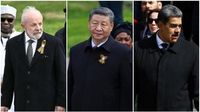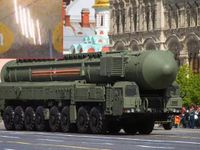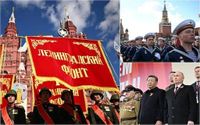On May 9, 2025, Russia marked the 80th anniversary of the defeat of Nazi Germany with a grand military parade in Red Square, a day steeped in historical significance and national pride. The event, known as Victory Day, was attended by Russian President Vladimir Putin and a host of international leaders, including Chinese President Xi Jinping, emphasizing the Kremlin's desire to showcase its military strength and political alliances amidst ongoing geopolitical tensions.
The atmosphere in Red Square was solemn yet celebratory, beginning with a minute of silence at 10:20 AM to honor the 27 million Soviet lives lost during World War II. This moment of reflection, requested by Putin, was a poignant reminder of the sacrifices made during the Great Patriotic War. Following the silence, the parade commenced, featuring over 10,000 soldiers who responded to Putin's call with a resounding cheer, a display of military might intended to reinforce national unity.
Putin's speech during the event was notably restrained compared to previous years. He refrained from harsh criticisms of the West, focusing instead on themes of unity and remembrance. "We remember the lessons of the Second World War and will not allow any distortion of those events," he stated, flanked by Xi Jinping and 26 other heads of state. This year, the parade included military units from China, Egypt, Vietnam, and Burma, showcasing a blend of historical and modern military capabilities.
Among the foreign leaders present were Brazilian President Luiz Inacio Lula da Silva, Egyptian President Abdel Fattah al-Sisi, Serbian President Aleksandar Vucic, Venezuelan President Nicolas Maduro, and several leaders from African nations, including Burkina Faso's military leader Ibrahim Traore. The event highlighted Russia's efforts to project an image of international support, particularly in light of its ongoing conflict with Ukraine, which has strained relations with Western nations.
Putin's remarks were underscored by a narrative linking the current military operation in Ukraine to the historical struggle against Nazism. He declared, "The whole country, society, and people support the participants in the special military operation," referring to the invasion of Ukraine that began on February 24, 2022. This rhetoric aims to frame the conflict as a continuation of Russia's fight against fascism, a theme that has been a cornerstone of Putin's propaganda since the onset of the war.
The military parade itself was a spectacle of power, featuring a wide array of armored vehicles and weaponry. Notably, T-34-85 tanks and SU-100s from World War II were paraded alongside modern military hardware, including T-72B3M and T-80BVM main battle tanks, which have been updated with additional armor for use in Ukraine. Newer models such as the 2S43 “Malva” howitzer and Iskander-M missile systems were also showcased, signaling Russia's ongoing military development despite the challenges posed by the protracted conflict.
As the parade unfolded, the streets of Moscow were heavily secured, with extensive traffic restrictions and security checks in place. This heightened security reflects the tense atmosphere surrounding the event, as Russia continues to navigate its international isolation following its invasion of Ukraine. Yet, the presence of international leaders served as a counter-narrative to claims of isolation, suggesting that Russia still holds sway in certain global political circles.
Following the parade, Putin took time to thank the commander of North Korean forces who participated in the operations against Ukrainian troops, further solidifying military ties with North Korea amid a backdrop of international sanctions and diplomatic challenges. The inclusion of North Korean officials underscores Russia's strategy to bolster alliances with nations that share its geopolitical interests.
The parade also featured a display of historical uniforms and a variety of military units, including a cavalry unit and troops equipped with modern weaponry. The event concluded with a display of intercontinental ballistic missiles, a stark reminder of Russia's status as a nuclear power. Notably absent this year was an extensive air show, which had been a highlight in previous years, reflecting perhaps a shift in focus towards ground forces.
The significance of the Victory Day celebrations extends beyond mere military display; it serves as a unifying event for the Russian populace, a moment to reflect on shared history and national resilience. Families, veterans, and children filled the stands, many wearing military caps adorned with Soviet insignia, embodying the enduring legacy of the Soviet victory over fascism.
In a broader context, the parade represents a calculated effort by the Kremlin to reinforce national pride and solidarity amidst ongoing conflict. The narrative that Russia is a bastion against Nazism and a defender of global justice is central to Putin's messaging, especially as he faces increasing scrutiny over his military actions in Ukraine.
As the world watches, the 80th anniversary of Victory Day in Russia serves as both a celebration of past triumphs and a stark reminder of the current geopolitical landscape. With tensions running high and alliances being tested, the significance of this day resonates far beyond the borders of Russia, echoing in the halls of international diplomacy.
In this complex tapestry of history, memory, and contemporary politics, the Victory Day parade stands as a testament to Russia's enduring narrative of strength and resilience, even as the nation grapples with the realities of its present conflicts.






